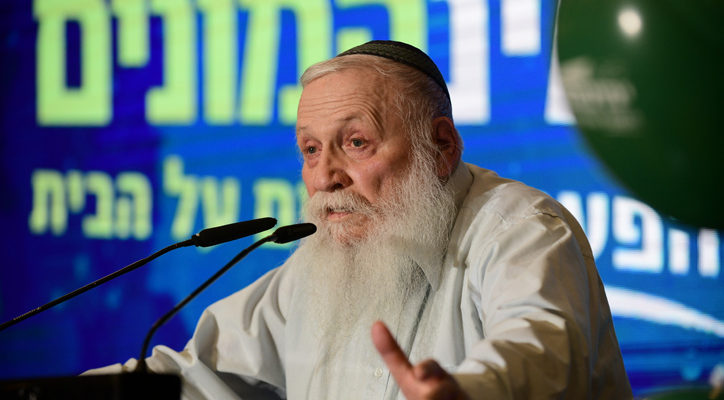Rabbi Haim Druckman, 90, an Israel Prize winner, was a Holocaust survivor who grew up to lead the religious Zionist sector.
By Batya Jerenberg, World Israel News
Rabbi Haim Druckman, spiritual leader of the religious Zionist sector in Israel, passed away Sunday night from Covid complications. He was 90 years old.
Druckman was born in 1932 in Kuty, Poland (now part of Ukraine). When World War II broke out, the town was under Soviet control for the first two years. When the Germans broke their pact with Stalin and took over all of Poland, his family escaped death twice – first when their hiding place was not discovered during a Nazi raid, and then when being smuggled across a rising river into Romania.
His parents gave him to a childless couple who had certificates allowing them to emigrate to Mandatory Palestine in 1944, and joined him there after the war.
Druckman attended national religious schools, served in the IDF, and became one of the closest students of Rabbi Tzvi Yehuda Kook, the visionary of religious Zionism who led the Merkaz Harav Yeshiva in Jerusalem.
Druckman founded the Ohr Etzion Bnei Akiva High School (Bnei Akiva is a youth group run by the religious Zionist Mizrachi organization), which counts among its graduates outgoing Defense Minister Benny Gantz and other Israeli leaders.
He then helped establish and lead for decades the national yeshiva hesder program in which thousands of religious Israelis combine Torah learning and army service. For the last 26 years, he also headed the country’s Bnei Akiva high school system for boys and girls.
The rabbi went into politics in 1977 on the National Religious Party’s list, opposing the 1982 withdrawal from the Sinai mandated in the Camp David Accords that led to peace with Egypt. He stayed in the Knesset until 1988, and then served again from 1999 to 2003.
A fierce proponent of the Greater Land of Israel movement, he was one of the founders of Gush Emunim, which encouraged settlement of all of Judea and Samaria. In 1993, he survived a terrorist attack on the way to Kiryat Arba, a suburb of Hebron, when Palestinians fired on his car, killing his driver.
Appointed in 2004 by then-prime minister Ariel Sharon, Druckman served as head of the state’s Conversion Authority in the Prime Minister’s Office for several years, taking a more lenient approach that angered the ultra-Orthodox sector although it was based on solid halachic (Jewish legal) precedent. He made waves when he supported the desire of the Religious Services minister of the last government, Matan Kahana, to reform the conversion system and allow municipal rabbis to convert residents of their cities.
He would not compromise on the Jews’ hold on the land of Israel, calling before the 2005 expulsion from Gush Katif, the Jewish communities in Gaza, for soldiers to refuse what he deemed illegal orders to evacuate settlements.
Druckman received the Israel Prize in 2012 for his contributions to society and education.
Throughout his later years, he was the acknowledged leader of the national religious sector and was consulted frequently by its religious and political leaders, including both the more liberal former prime minister Naftali Bennett and Betzalel Smotrich, the conservative head of the Religious Zionism party.
Druckman was seen as a pragmatist and a moderate by non-religious politicians, and his death pained many of them.
Prime minister-designate Benjamin Netanyahu said he felt a personal loss.
“A great light of love for Israel went out today. At this time of farewell to Rabbi Haim Druckman, my heart aches deeply with his dear family and with so many people in the nation,” he said. “The State of Israel has lost a great spiritual leader, and I have lost a personal friend whom I greatly admired.”
Outgoing Prime Minister Yair Lapid “shared in the family’s grief,” and called him “a man who was all about the love of Israel.”
President Isaac Herzog said he “mourns” the rabbi, who “was a public emissary and spiritual leader who led in vision and action some of the most important Torah, Zionism and revival enterprises of our generation.”
The rabbi’s funeral is expected to draw thousands of mourners, beginning at noon in his hometown of Mercaz Shapira in the south and ending at the nearby Massuot Yitzchak cemetery, where only the family will attend the burial.




